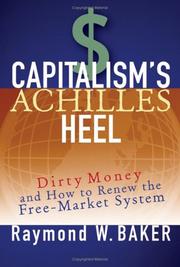| Listing 1 - 4 of 4 |
Sort by
|

ISBN: 9780471644880 0471644889 Year: 2005 Publisher: Hoboken, N.J. John Wiley & Sons
Abstract | Keywords | Export | Availability | Bookmark
 Loading...
Loading...Choose an application
- Reference Manager
- EndNote
- RefWorks (Direct export to RefWorks)
Capitalism --- Commercial crimes. --- Corruption. --- POVERTY. --- Poverty. --- Utilitarianism. --- Moral and ethical aspects. --- General ethics --- Economics
Book
ISBN: 1280278048 9786610278046 0471748587 Year: 2005 Publisher: Hoboken, N.J. : John Wiley & Sons,
Abstract | Keywords | Export | Availability | Bookmark
 Loading...
Loading...Choose an application
- Reference Manager
- EndNote
- RefWorks (Direct export to RefWorks)
For over forty years in more than sixty countries, Raymond Baker has witnessed the free-market system operating illicitly and corruptly, with devastating consequences. In Capitalism's Achilles Heel, Baker takes readers on a fascinating journey through the global free-market system and reveals how dirty money, poverty, and inequality are inextricably intertwined. Readers will discover how small illicit transactions lead to massive illegalities and how staggering global income disparities are worsened by the illegalities that permeate international capitalism. Drawing on his experiences,
Capitalism --- Commercial crimes. --- Corruption. --- Poverty. --- Utilitarianism. --- Moral and ethical aspects.
Book
ISBN: 9781523003044 1523003049 Year: 2023 Publisher: New York : Berrett-Koehler Publishers, Incorporated,
Abstract | Keywords | Export | Availability | Bookmark
 Loading...
Loading...Choose an application
- Reference Manager
- EndNote
- RefWorks (Direct export to RefWorks)
Essential reading for anyone truly interested in saving democracy from the predations of kleptocracy and plutocracy. -Charles Davidson, The Journal of Democracy This book expands our understanding of the financial secrecy system dominating capitalism today and shows how we can create accountability to restore our democracy. Over the last half century, capitalism has created the means for trillions of dollars, euros, pounds, and other stores of wealth to move invisibly-beyond the control of central bankers, law enforcement agents, and international institutions. With an entire financial secrecy system now dominating capitalist operations, riches flow inexorably upward and accelerate economic inequality. And rising inequality is directly imperiling-weakening, obstructing, and degrading-democracy. This book is not a screed against capitalism-it is a call for capitalism to return to its roots, reenergizing its synergies with democracy. Raymond Baker writes, Democratic capitalism is, in my judgment, the best system yet devised in political economy, but dysfunctions within its capitalist component are undermining the two-part system. Baker explains the tax havens, secrecy jurisdictions, disguised corporations, anonymous trusts, fake foundations, regulatory loopholes, money laundering techniques, and more that make up the financial secrecy system. But he goes beyond the what to the why, examining the motivations driving the system that generates and shelters trillions of dollars that could go toward spreading wealth, generating public goods, and protecting the environment. Going deeper, Baker illustrates how these realities further corrode the commonwealth, with chapters devoted to the facilitating activities and impacts of banks, corporations, enabling lawyers and accountants, governments, and international institutions and concluding with the limiting role played in policy silos that are missing the bigger picture. Finally, he provides specific, pragmatic measures to reset capitalism so that it once again contributes to shared prosperity and sustained democracy. This is a magisterial treatment of an issue that is at the root of so many problems that plague our nation and the world today.
Capitalism --- Corruption --- Secrecy
Book
ISBN: 1783718285 1849643997 9781849643993 074532813X 9780745328133 9780745328126 0745328121 074532813X 9780745328133 9781783718283 Year: 2010 Publisher: London : Pluto Press,
Abstract | Keywords | Export | Availability | Bookmark
 Loading...
Loading...Choose an application
- Reference Manager
- EndNote
- RefWorks (Direct export to RefWorks)
Why did the invasion of Iraq result in the destruction of culture and murder of intellectuals? Convention sees accidents of war and poor planning in a campaign to liberate Iraqis. The authors argue instead that the invasion aimed to dismantle the Iraqi state to remake it as a client regime. Post-invasion chaos created conditions under which the cultural foundations of the state could be undermined. The authors painstakingly document the consequences of the occupiers' wilful inaction and worse, which led to the ravaging of one of the world's oldest recorded cultures. Targeted assassination of over 400 academics, kidnapping and the forced flight of thousands of doctors, lawyers, artists and other intellectuals add up to cultural cleansing. This book lays to rest claims that the invasion aimed to free an educated population to develop its own culture of democracy.
Iraq War, 2003-2011 --- Cultural property --- Intellectuals --- Destruction and pillage. --- Protection --- Social conditions --- Iraq --- Intellectual life
| Listing 1 - 4 of 4 |
Sort by
|

 Search
Search Feedback
Feedback About UniCat
About UniCat  Help
Help News
News